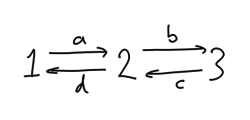Difference between revisions of "M(4,2,2)"
(→Projective indecomposable modules) |
|||
| Line 26: | Line 26: | ||
|O-morita-frob = 1 | |O-morita-frob = 1 | ||
|Pic-O = <math>\mathcal{T}(B)=C_2</math> | |Pic-O = <math>\mathcal{T}(B)=C_2</math> | ||
| + | |PIgroup = <math>S_4 \times C_2</math> | ||
|source? = Yes | |source? = Yes | ||
|sourcereps = <math>B_0(\mathcal{O}A_5)</math> | |sourcereps = <math>B_0(\mathcal{O}A_5)</math> | ||
| Line 33: | Line 34: | ||
|coveringblocks = M(4,2,2) | |coveringblocks = M(4,2,2) | ||
|coveredblocks = M(4,2,2) | |coveredblocks = M(4,2,2) | ||
| + | |pcoveringblocks = [[M(8,5,2)]] (complete)<ref>This follows from Theorem 2.15 of [[References|[EL18a]]] since a covering block cannot have defect group <math>C_4 \times C_2</math>.</ref> | ||
}} | }} | ||
| Line 79: | Line 81: | ||
[[C2xC2|Back to <math>C_2 \times C_2</math>]] | [[C2xC2|Back to <math>C_2 \times C_2</math>]] | ||
| + | |||
| + | == Notes == | ||
| + | |||
| + | <references /> | ||
[[Category: Morita equivalence classes|4,2,2]] | [[Category: Morita equivalence classes|4,2,2]] | ||
[[Category: Blocks with defect group C2xC2]] | [[Category: Blocks with defect group C2xC2]] | ||
[[Category: Tame blocks|4,2,2]] | [[Category: Tame blocks|4,2,2]] | ||
Revision as of 17:05, 31 October 2018
| Representative: | [math]B_0(kA_5)[/math] |
|---|---|
| Defect groups: | [math]C_2 \times C_2[/math] |
| Inertial quotients: | [math]C_3[/math] |
| [math]k(B)=[/math] | 4 |
| [math]l(B)=[/math] | 3 |
| [math]{\rm mf}_k(B)=[/math] | 1 |
| [math]{\rm Pic}_k(B)=[/math] | [math]k^* \wr C_2[/math] |
| Cartan matrix: | [math]\left( \begin{array}{ccc} 2 & 2 & 1 \\ 2 & 4 & 2 \\ 1 & 2 & 2 \\ \end{array} \right)[/math] |
| Defect group Morita invariant? | Yes |
| Inertial quotient Morita invariant? | Yes |
| [math]\mathcal{O}[/math]-Morita classes known? | Yes |
| [math]\mathcal{O}[/math]-Morita classes: | [math]B_0(\mathcal{O}A_5)[/math] |
| Decomposition matrices: | [math]\left( \begin{array}{ccc} 0 & 1 & 0 \\ 1 & 1 & 0 \\ 0 & 1 & 1 \\ 1 & 1 & 1 \\ \end{array}\right)[/math] |
| [math]{\rm mf}_\mathcal{O}(B)=[/math] | 1 |
| [math]{\rm Pic}_{\mathcal{O}}(B)=[/math] | [math]\mathcal{T}(B)=C_2[/math] |
| [math]PI(B)=[/math] | [math]S_4 \times C_2[/math] |
| Source algebras known? | Yes |
| Source algebra reps: | [math]B_0(\mathcal{O}A_5)[/math] |
| [math]k[/math]-derived equiv. classes known? | Yes |
| [math]k[/math]-derived equivalent to: | M(4,2,3) |
| [math]\mathcal{O}[/math]-derived equiv. classes known? | Yes |
| [math]p'[/math]-index covering blocks: | M(4,2,2) |
| [math]p'[/math]-index covered blocks: | M(4,2,2) |
| Index [math]p[/math] covering blocks: | M(8,5,2) (complete)[1] |
Contents
Basic algebra
Quiver: a:<1,2>, b:<2,3>, c:<3,2>, d:<2,1>
Relations w.r.t. [math]k[/math]: ad=cb=bcda+dabc=0
Other notatable representatives
Projective indecomposable modules
Labelling the simple [math]B[/math]-modules by [math]S_1, S_2, S_3[/math], the projective indecomposable modules have Loewy structure as follows:
[math]\begin{array}{ccc} \begin{array}{c} S_1 \\ S_2 \\ S_3 \\ S_2 \\ S_1 \\ \end{array}, & \begin{array}{ccc} & S_2 & \\ \begin{array}{c} S_1 \\ S_2 \\ S_3 \\ \end{array} & \oplus & \begin{array}{c} S_3 \\ S_2 \\ S_1 \\ \end{array} \\ & S_2 & \\ \end{array}, & \begin{array}{c} S_3 \\ S_2 \\ S_1 \\ S_2 \\ S_3 \\ \end{array} \end{array} [/math]
Irreducible characters
All irreducible characters have height zero.
Back to [math]C_2 \times C_2[/math]
